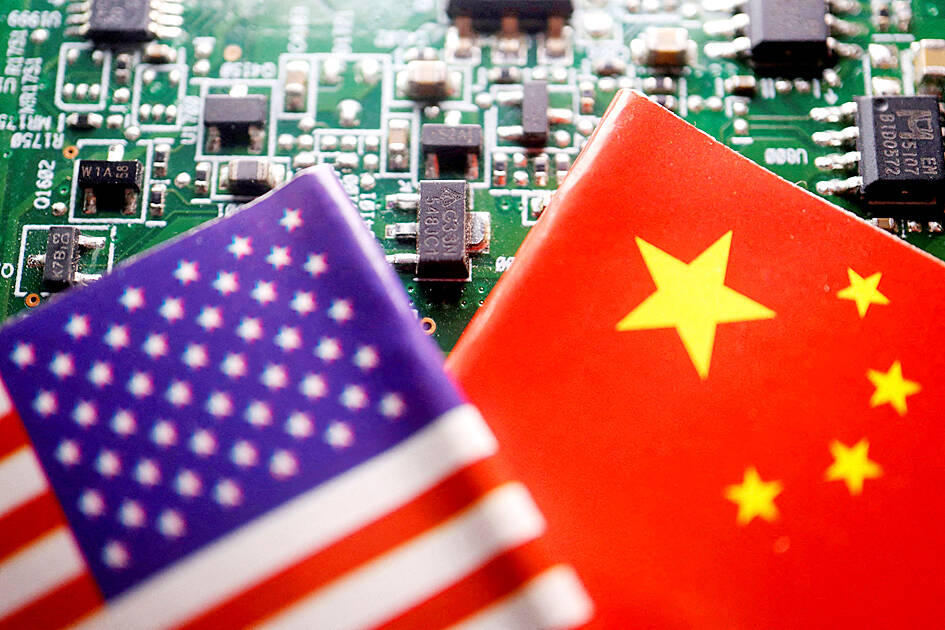The Pentagon on Wednesday added China’s leading memory chipmaker and prominent players in artificial intelligence (AI), energy and automobiles to a list of companies it accuses of aiding the Asian nation’s military, expanding a roster intended to warn allies against potential national security threats.
The US Department of Defense added Yangtze Memory Technologies Co (長江存儲) and facial-recognition firm Megvii Technology Ltd (曠視科技) to its so-called Section 1260H rundown. The 1260H specifically restricts access to some US defense contracts.
That list already includes major telecom and aerospace players, as well as Huawei Technologies Co (華為) and Semiconductor Manufacturing International Corp (SMIC, 中芯) — two companies at the heart of Beijing’s efforts to replace US technology.

Photo: Reuters
Included on the latest list are Advanced Micro-Fabrication Equipment Inc (中微半導體設備), one of the country’s biggest suppliers of gear for chip production, and IDG Capital, a prolific private equity and venture capital investor that has backed some of the highest-profile start-ups.
The Pentagon also flagged China Three Gorges Corp (中國三峽集團), which operates clean energy projects in China and 20 other countries, and an arm of the Hesai Group (禾賽集團), which makes LiDAR or road-sensing equipment used in autonomous driving systems. Its customers include Didi Global Inc (滴滴), Pony.ai (小馬智行) and General Motors Co’s Cruise robotaxi subsidiary.
Washington already imposes export curbs and other sanctions on Huawei, SMIC and other companies on the Pentagon’s roster, as part of a broader campaign to curb the rise of a geopolitical rival it deems a threat to its security.
The US government has in past years grown increasingly concerned about what it calls China’s military-civil fusion strategy, describing that concept as regular civilian companies aiding the Chinese People’s Liberation Army (PLA) in some fashion.
The role of AI in military use has also been a concern. Apart from Megvii, the Pentagon also added Yitu Technology (依圖科技) — another Chinese company that has already been sanctioned — to its 1260H list.
Asked about the move, the Chinese Ministry of Foreign Affairs yesterday condemned the US for “unreasonably suppressing Chinese firms.”
“These US actions violate principles of market competition and international economic and trade rules,” ministry spokesman Wang Wenbin (汪文斌) said, adding it would “harm the interests of US firms and investors.”
“This will come back to bite them,” Wang said.
Additional reporting by AFP

Taiwan Semiconductor Manufacturing Co (TSMC, 台積電), the world’s biggest contract chipmaker, booked its first-ever profit from its Arizona subsidiary in the first half of this year, four years after operations began, a company financial statement showed. Wholly owned by TSMC, the Arizona unit contributed NT$4.52 billion (US$150.1 million) in net profit, compared with a loss of NT$4.34 billion a year earlier, the statement showed. The company attributed the turnaround to strong market demand and high factory utilization. The Arizona unit counts Apple Inc, Nvidia Corp and Advanced Micro Devices Inc among its major customers. The firm’s first fab in Arizona began high-volume production

VOTE OF CONFIDENCE: The Japanese company is adding Intel to an investment portfolio that includes artificial intelligence linchpins Nvidia Corp and TSMC Softbank Group Corp agreed to buy US$2 billion of Intel Corp stock, a surprise deal to shore up a struggling US name while boosting its own chip ambitions. The Japanese company, which is adding Intel to an investment portfolio that includes artificial intelligence (AI) linchpins Nvidia Corp and Taiwan Semiconductor Manufacturing Co (TSMC, 台積電), is to pay US$23 a share — a small discount to Intel’s last close. Shares of the US chipmaker, which would issue new stock to Softbank, surged more than 5 percent in after-hours trading. Softbank’s stock fell as much as 5.4 percent on Tuesday in Tokyo, its

COLLABORATION: Softbank would supply manufacturing gear to the factory, and a joint venture would make AI data center equipment, Young Liu said Hon Hai Precision Industry Co (鴻海精密) would operate a US factory owned by Softbank Group Corp, setting up what is in the running to be the first manufacturing site in the Japanese company’s US$500 billion Stargate venture with OpenAI and Oracle Corp. Softbank is acquiring Hon Hai’s electric-vehicle plant in Ohio, but the Taiwanese company would continue to run the complex after turning it into an artificial intelligence (AI) server production plant, Hon Hai chairman Young Liu (劉揚偉) said yesterday. Softbank would supply manufacturing gear to the factory, and a joint venture between the two companies would make AI data

The Taiwan Automation Intelligence and Robot Show, which is to be held from Wednesday to Saturday at the Taipei Nangang Exhibition Center, would showcase the latest in artificial intelligence (AI)-driven robotics and automation technologies, the organizer said yesterday. The event would highlight applications in smart manufacturing, as well as information and communications technology, the Taiwan Automation Intelligence and Robotics Association said. More than 1,000 companies are to display innovations in semiconductors, electromechanics, industrial automation and intelligent manufacturing, it said in a news release. Visitors can explore automated guided vehicles, 3D machine vision systems and AI-powered applications at the show, along